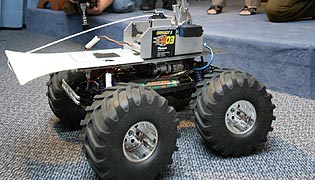Entered into the database on Sunday, August 14th, 2005 @ 16:51:37 MST
Bomb seeking robots, spy planes and a handheld device that translates a soldier's
English commands or questions into Arabic are some of the high-tech battlefield
equipment developed for use by US forces in Iraq. Colonel Gregory Tubbs, who heads an army program that looks for relatively
quick technological fixes for problems arising in combat in Iraq and Afghanistan,
showed off a number of items at a Pentagon press conference. Other technology includes surveillance cameras that can be deployed on blimps
and towers; a light weight metal detector for finding weapons caches and jammers.
The US Army has also deployed about 30 robots with troops in Iraq to scout
out suspected roadside bombs, and has placed orders for several hundred more. "To me, it's a lot like an Easter Egg hunt: If you have more Easter egg
hunters, you'll find more Easter eggs," said Col Tubbs. The Marcbot robot is a small, wheeled vehicle that carries a camera atop an
arm that can be manipulated by remote control from several hundred feet away.
They used only to visually identify mines or improvised explosives concealed
animal carcasses, or plastic bags, but not to dispose of them. "There's 30 out there now," Col Tubbs said. "I'm in the process, in the next probably six months, of putting another
couple of hundred in the field." He said several hundred were on order at $US8,000 apiece. Another version, called the Toughbot, has been developed with urban combat
in mind. Instead of sending a soldier through a door, the Toughbot can be thrown into
a room through a window, Col Tubbs said. "It's got two cameras on it. He could very easily and rapidly interrogate
the interior of the room before live humans came in the area," he said.
A highlight was the Tacmav - an ultralight, unmanned spy plane with an 45 centimetre
wingspan that loiter for more than 30 minutes. It also can be collapsed into a bundle small enough to go into a backpack.
Col Tubbs acknowledged it was a fairly unsophisticated system designed for
foot soldiers. "All I want to do with this type tool is to see over the hill and to see
around the corner," he said. "Now, it sounds, kind of, overly simplistic. But if you're on the ground
and you're worried about the enemy killing you, a lot of times you just want
to see around the corner to see what's there before you go around the corner."
The system has not been deployed to Iraq yet, in part because few soldiers
in Iraq have time to go through the three to four week training. Its developers are trying to shorten the training time. A three-plane system costs $US39,000, Col Tubbs said.
A multifunction agile remote control robotic (Marcbot) on display at
the Pentagon during demonstration of new battlefield technology